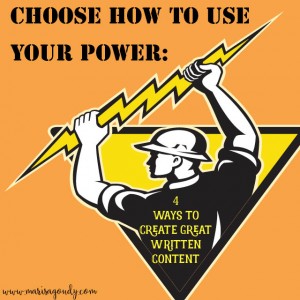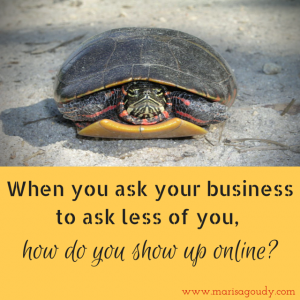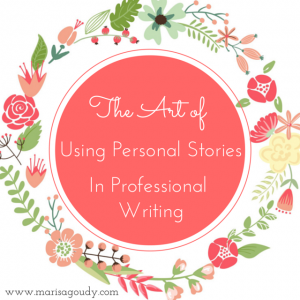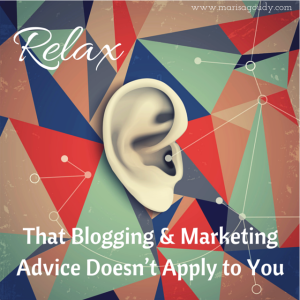
BLOG
Choose How to Use Your Power: 4 Ways to Create Great Written Content
Sovereign Standard, Issue 22 We live in an abundant universe and we are the ultimate authors of our lives.
We live in an abundant universe and we are the ultimate authors of our lives.
That’s all fine and good, but you only have so much time to write your business’s stories and get that blogging done.
How are you going to use your power?
“Write this week’s post” or “update the website copy” are on your to do list. You've decided to apply your power to crafting your ideas into words and sharing them with people who want lives that are more beautiful, bearable, or bold. Yay!
 And you intend to take the ideas from draft to final copy all by yourself because you love to write, you’re on a budget, or because you fear you’d sacrifice authenticity if you outsourced it… but is that the right choice? Is that how you really want to use your power?
And you intend to take the ideas from draft to final copy all by yourself because you love to write, you’re on a budget, or because you fear you’d sacrifice authenticity if you outsourced it… but is that the right choice? Is that how you really want to use your power?
As I write this, my five year old is trying to make the Eiffel Tower out of mostly dried up Play-Doh. I am only 95% sure that the markers my toddler is using to draw all over her t-shirt are washable.
My maternal powers are diluted and I'm sure every paragraph I write is riddled with typos.
But I am making it work. I choose to see myself as powerful - at least according to Michele Woodward’s definition.
“Power is the ability to get stuff done.”
This definition was a common refrain in a recent How She Really Does It podcast in which Michele and Koren Motekaitis put a positive spin on power. Yes, we all have the capacity to build and store power, but how are we going to use power in helpful, efficient ways?
Choose How to Use Your Power: 4 Different Ways Create Great Written Content
You’re on board with content marketing. You’ve been storing up stories and ideas for ages. Your website looks great and is waiting for the right copy and a consistent blog.
It’s time to channel your power and get this writing stuff done. How do you make that happen?
The answer isn’t necessarily simply “go write.”
1) Give it up: Outsource your content writing completely
You can fully empower a ghostwriter to do it all from topic research to writing to image selection to posting the piece.
When this works best: There are lots of news and information sources related to your field that a trusted writer can review and translate for your audience based on your company story. Early in my writing career I combed the medical research and did this sort of blogging for a nutritional supplement company.
When this doesn’t serve you: If you have a personal brand, it’s reliant on your voice and your stories. This hands-off approach doesn’t generally serve coaches, healers, or those who sell information and wisdom that stems from personal experience.
2) Team up: Partner with a writer
Develop a relationship with a writer who becomes part of your team. She’ll get to know you, your brand, and your vision and ask questions from an outside perspective that will help expand your vision of what you’ll have to offer. You’re part of the brainstorming process but she takes care of organizing all the ideas and making the words sing.
When this works best: You have a ton of big ideas and general concepts you want to share. Your business is strong enough that you can afford to invest in this process – good writers will require a lot of time and attention at the beginning as they endeavor to really understand you, your voice, and your brand.
When this doesn’t serve you: Even though you are very involved in the process and will be the instigator of every piece of writing, you’re a step removed from the process. Since you’ve both agreed that the writer would publish under your name and you paid for the service, the intellectual property is yours and the product is 100% yours. But, if you have a writer’s soul you may not feel that this option suits your needs.
3) Tune up: Hire a Writing Coach
When you work with a writing coach, it's your writing - only better. A writing coach will help you meet your editorial goals now and build skills that will take you far into the future. Plus, you'll have the insights that only a "second pair of eyes" can really offer. This makes you a better writer and it also helps you dig deeper into your own stories and wisdom.
When this works best: Writing doesn’t come all that easily to you, but you want to get better at it. Or maybe it's easy for you to fill "ideas" notebooks but you never make the time to turn that material into polished posts. You also worry that your writing style doesn’t lend itself to the needs of the skimming internet audience. No matter what, the stress over making it perfect kills the joy you find in the process.
Learn more about the writing coaching relationship.
When this doesn’t serve you: Your business is at a stage where you’re more focused on scaling your business and landing speaking gigs. You don’t harbor any dreams of being a writer and would be better served partnering with a writer who can translate your ideas into prose.
4) Train up: For the bootstrapper who has time to teach herself the craft
Writing is a skill. The more you practice, the better you’ll get at it. There are loads of resources out there from Copyblogger’s free library and paid training programs to big old books on the subject like the Copywriter’s Handbook by Robert W. Bly. I refer to both when I’ve written myself into a corner, I need inspiration, or I need help remembering that writing for the internet is more about selling than writing much of the time.
When this works best: You have more time than money to invest in sharpening your writing skills. You likely trust your writing skills enough and enjoy writing enough that you can follow a set of tips to tune your craft.
When this doesn’t serve you: Writing scares you and depletes you and you’re intimidated rather than energized by the DIY approach. You understand that consulting with an expert who is focused on your individuals needs and challenges will help you build your business and your writing skills faster and more efficiently.
How will you use your superpowers to get more of the vital work done?
I’ve been “the writer” in all these situations. Because every entrepreneur, creative, and healing professional has her own needs and superpowers, each writing approach is valid.
At this stage in my career, I see my clients experience the most personal growth and satisfaction when they go the writing coaching route. In addition to producing great content today, they’re preparing themselves to handle a marketing scene that will always demand good writing. And when it’s time to write that book? They’re ready.
How can I help you amplify your superpowers? Check out the services page.
How to Heal Chronic Internet Fatigue Syndrome
Sovereign Standard, Issue 21 What’s the number one reason bloggers quit writing?
What’s the number one reason bloggers quit writing?
Forget that… what’s the number one reason you want to quit the writing practice that's mean to build your business or your professional platform?
Because nobody seems to read what you write, right?
It’s one thing to know that most online readers are just skimming, it’s another to feel like you’re not even reaching those eyeballs.
 You slip into despair if your site stats don’t match up to the investment you made in the post. Who can blame you? Writing a from-the-heart, meaningful, useful post every week or two takes a lot out of you, but it’s a labor of love.
You slip into despair if your site stats don’t match up to the investment you made in the post. Who can blame you? Writing a from-the-heart, meaningful, useful post every week or two takes a lot out of you, but it’s a labor of love.
It’s the next step, the “doing social media” to get the link in front of prospective clients and readers that pushes the whole venture into mission: impossible territory.
Unless you have a fully charged phone while you’re in line at the DMV or killing time someplace similar. In that case, you have time to share the blog post on every social media platform you’ve ever heard of.
Those deep dives into social media can be really useful, but soon they teach you something vital...
Social Media Isn’t About Posting Strategy or Likes, It’s About Real Relationships
Getting people to read what you write really isn’t about crafting Tweets and status updates and making everything sweet-as-pie Pinnable.
If you don’t have the online relationships, even the best piece of content is likely to languish in obscurity on your under appreciated blog.
As social media matures and the networks figure out how to monetize their “free” platforms, it becomes increasingly hard to hear and be heard above the noise.
Instead of tuning in to every Mari Smith email and Social Media Examiner podcast like I used to, I’m focusing on nurturing real connections with people I care about. It's the only way to heal a modern disease I bet you know all too well...
Are you suffering from Chronic Internet Fatigue Syndrome?
My case of Chronic Internet Fatigue Syndrome flares up regularly. Sick of the sales pitches, the false promises, the self aggrandizement, and the sheer meaninglessness of it all, I burn out and hide myself in a few good novels. (Or a Candy Crush Soda binge… don’t judge me.)
During these hibernation periods I tend to lose hard won footing in the social universe. The disappearing acts make me seen inconsistent and, hence, I'm easily forgotten or dismissed.
It’s easy to claim “because my kids” but really, I just can’t sustain these online “connections” that aren’t forged in real, sustaining reciprocal relationships.
At the early stages of building a platform and becoming a trusted voice in your area of expertise, it feels like it’s all about giving, producing, and introducing yourself. It's so easy to burn out. Eventually, you’ll reap what you sow and see a return on all that effort, but only if you are offering yourself and your writing to the right people.
The Writer’s Cure for Chronic Internet Fatigue Syndrome?
 Reach.Connect.Uplift Women
Reach.Connect.Uplift Women
As with any chronic ailment, the goal is to break the cycle and enjoy sustained health and vitality. You want to find a sustainable online community that loves to read what you write and offers up content that betters your personal and professional life as well.
You do, right?
Ok, so come join me over at the Reach.Connect.Uplift Women Forum because I think it’s the cure for digital burnout.
Just when I realized I needed to break my feast or famine social media efforts and focus on an online community that gave as good as it got from me, founder Lany Sullivan told me about how the RCUWomen Google+ group was migrating to its own membership forum.
As Lany describes it, "We decided to go old school and build a forum on our website that we could really let loose and have a broader reach. "
What, it's 2015 and we're back to a message board? If you're getting lost in the social media crowds, it may be just the medicine your content creator's soul craves.
Here's Lany's explanation of "why a Reach.Connect.Uplift Women Forum, why now?":
We want a platform that allows us to really highlight our members, provide valuable resources, and be able to monitor and manage it with maximum efficiency. Social Media doesn’t do that for us or our members.
Building an audience off social allows us to have a greater impact, better connections and deeper relationships with our members. Instead of sifting through the millions of posts on social everyday, our members can drop by the forum for some of the top content in the market. Plus, we have some additional SEO and link building benefits that has a positive impact for everyone.
So, will you join me over on the new forum? My social streams and my inbox are too full and I'm missing your great content, but I know I'll see it if you become a RCUWoman too (and guys, if you've got the stones to join the ladies, we'd love to have you too!)
Does your business need a blog? Depends on what you need from your business
Sovereign Standard, Issue 16 I’m a frugal lass. I squeeze the toothpaste tube for a week longer than any sane person would and I still manage to have fresh breath.
I’m a frugal lass. I squeeze the toothpaste tube for a week longer than any sane person would and I still manage to have fresh breath.
If there’s still some meaning to be eked out of a revelation like “I gotta quit entrepreneurship,” I’m going to find it. I’m obligated to find it. (Yeah, I get that this can be obsessive, exhausting, and self-defeating.)
 Then I’m going to spend a few hours crafting it into words. And then I am going to share it with my readers - even if the article doesn’t take me one inch closer to attracting copywriting clients or further my creative projects.
Then I’m going to spend a few hours crafting it into words. And then I am going to share it with my readers - even if the article doesn’t take me one inch closer to attracting copywriting clients or further my creative projects.
Blindness? Egomania? Fear of missing out?
Can we call it dedication? I’ve found a tribe who, like me, is feeling the crush of creative entrepreneurship and the idea just won’t leave me alone.
You’re downshifting from entrepreneurship into freelancing. It’s time to do the work that immediate rather than pioneering a visionary program or building a firm (at least for now).
Living and working like the creative-in-business you want to be may mean adjusting how you do business by offering the basic, 'useful' services.
This is why I am shifting my attention to offering the right people my copywriting and editing services while the 'real' creative work gestates in the dark for a while.
Read the rest of Burned Out? Maybe It’s Time to Split the Creative from the Professional
When it comes down to it, “don’t waste anything!” probably isn’t a good enough reason to keep writing about a concept that may or may not be aligned with personal and professional goals.
So I ask myself (in the way I know best - a piece of writing I intend to publish) do I even need to keep blogging and sending out the Sovereign Standard if I’m redefining my relationship to my business?
As you ask your business to ask less of you, how will you show up online?
So, what if you are called to make a shift in how you relate to your business?
Tons of your behind the scenes habits and attitudes will change, but the hardest changes you make will relate to how you decide to show up online.
You know you still have to think about your visibility, consistency, and reputation. Even if you're happily shutting down a larger company, with creative dreams like yours, there's going to be a time when you want an audience who knows and loves you.
Over-hyped as it may seem, content marketing is key to building a business in 2015. It's key to building a creative platform as well. We hear about “the importance of creating compelling content, of all lengths, and across all platforms” from countless sources. Everybody’s doing it and if you’re serious about building a business or a platform as an author or thought leader, you have to do it too.
(Wait, is that really true?)
Not surprisingly, I do think writing is important - even essential. But, you don't blog because "they" say you must or because you think it's fun compete against mega stars and companies with mega budgets as everyone vie for the web surfers' finite attention.
You create written content because it supports your personal, professional, and creative growth. Ultimately, you need to establish a writing practice that gives back to you.
Must you write for your business (even if you’re scaling it back)?
You've got so much going on. You just want a break. The point is to devote creative energy to the work that matters, not to the marketing and the ephemeral blog posts...
Can you just quit?
As with most answers to important questions, there is no one single “should” when it comes to deciding how you’ll figure out how to show up after you change the rules to your own professional game.
Instead, there are just more questions. This is what I'm asking myself as I restructure my relationship with my work.
How do you write for a changed business? The practical marketing questions
- Do I have enough contacts and other resources to pull in the clients I need without doing my own content marketing?
- What do I blog about now that I am running a more “low key” business that’s built on my scale, not to be scalable?
- Do the clients who hire a smart, competent freelancer want something different than clients who are investing with a creative entrepreneur?
Pause. Here's an answer to those last two questions: Remember that clients don’t really care about what you call yourself as long as you get the work done. And readers don’t care either as long as you’re interesting and helpful.
A new opportunity to prioritize writing for business (or not) and to honor your creativity no matter what
Yes, no, maybe? Business writing is time consuming enough without adding the pressure of an existential blogging crisis on top of it all. Let's cut through the deliberation and establish what's most important:
If you still have to earn a livelihood as a self-employed person, you fundamentally need to focus on the income-generating activities that will sustain you today, tomorrow, and in the near future.
And, if you want to be the person you know you're mean to be you also need to honor and creative acts will nourish you today, tomorrow, and in the near future.
To that end, I'm going to ask myself these three questions before I sit down to write another word on any project.
- Am I writing this for myself and/or to further my creative vision?
- Am I writing this to win real business?
- Am I writing this because part of me has been trained to equate “likes” and spikes in my site stats with approval?
Tell me, what other questions do you ask yourself as you decide how to spend your precious writing time. And if you have any answers? Glory, glory, they're more than welcome too!
The Art of Using Personal Stories In Professional Writing
 Sharing bits of your own life can be an ideal way to connect with your reader and show that you’re delightfully (or horribly!) human.
Then again, it can be a risk. Sharing too much or nattering on about something that bores your audience can kill engagement and lead to unsubscribes.
Sharing bits of your own life can be an ideal way to connect with your reader and show that you’re delightfully (or horribly!) human.
Then again, it can be a risk. Sharing too much or nattering on about something that bores your audience can kill engagement and lead to unsubscribes.
As with anything, it’s about striking the right balance. For the creative entrepreneur, that means blending a story that piques interest with useful information your readers can apply to their own lives.
Your mission: weave together story & news they can use
Two general guidelines as you balance story and practical information in your business writing:
- Provide just-juicy-enough details and personal revelations, while honoring that this is a professional space, not a confessional one.
- Remember that the reader is the hero, not you (even if you’re using your own crumby day or ecstatic moment to get an idea across). The article you’re writing or the talk you’re giving may open with lots of “I did this…” and then “I thought that…” language, but you want to bring it back to the “you” by the end of the piece.
Does every personal story need to offer the reader an obvious “what’s in it for me?”
Just as balance isn’t always about 50/50, “make your own story about the reader” isn’t true 100% of the time - at least not in an overt way.
Business writing and blogging isn’t memoir writing, but we can take a cue from the Elizabeth Gilberts and Cheryl Strayeds of the world… Even when the story is purely personal, strangers can see their own story in a first person narrative.
If you trust your readership to interpret the story and understand that they can follow your example or heed a cautionary tale, you may be able to carry the autobiographical approach all the way to end.
When you’re starting out, however, stick with this basic rule: employ a compelling story from your own life to illuminate something you’d like your readers to examine or try in their own lives.
- Be obvious about the connection between story and "lesson."
- Transition from prose to a list. (This makes it clear for the reader that they're in the "teaching bit" of the article.)
- Shift from using“I” at beginning to using “you” at the end.
Interested in seeing that in action? I walked my talk in last week’s Sovereign Standard post: As Entrepreneurs, As Writers, As Mothers: What’s “Enough”?
Did you know it was possible to take the story of a fourteen month old’s split lip and use it to describe how to best prioritize your business writing? I didn’t either…
But, as I worked through the worry and the guilt that sprang from failing to protect my girl (from gravity and a wee bit of questionable maternal judgment), I eventually arrived at secure state of “enoughness.”
And "enoughness" isn't just essential to the harried mama - it's essential for the overcommitted entrepreneur trying to honor client work and business building and the writing practice that feeds her soul as well as her marketing duties.
Learn how the Story Triangle can help you balance TMI and just enough details to draw your readers in. Sign up for the free webinar.
Relax, Their Blogging and Marketing Advice Doesn’t Apply to You
 It’s your business to make life more beautiful, bearable, or bold for a select group of people.
You want to be more visible, telling your brand’s story and your own stories. Launching a blog or devoting yourself to a regular business writing process on your current website is the right decision.
It’s your business to make life more beautiful, bearable, or bold for a select group of people.
You want to be more visible, telling your brand’s story and your own stories. Launching a blog or devoting yourself to a regular business writing process on your current website is the right decision.
Here’s the first thing to do: stop listening to advice for bloggers.
Tune out the smart, reputable marketing experts with their experience and convincing facts and figures.
They’re not talking to you.
(And, of course, you also want to stop listening to the “get rich quick” business gurus, but you already knew that.)
But back to those intelligent, compelling marketing marketing minds and what elements of their advice you can ignore...
You’re Not the Every(wo)man Blogger
About 15 - 20% of Americans are involved in entrepreneurial ventures.
A large proportion of those individuals make utilitarian products and sell everyday services like septic tank maintenance. Most of those companies rely on old fashioned advertising to find new buyers.
There’s a smaller slice of the self-employed population that will experiment with content marketing and launch a blog or develop other types of media to educate and entertain and entice new business.
Though they’re surely speaking to marketing officers at larger corporations too, the majority of the blogging and marketing experts are pitching their message at this group of "traditional" business folks.
Since you’re an entrepreneur interested in creating content, you’ll want to listen to the same podcasts and consume the same articles as the car salesmen and the electricians, right? After all, there are business fundamentals that apply to everyone, don't they? You can just filter out the bits that don’t fit your ideal clients.
No.
 Stop filtering as you listen! There's too much noise in your life already.
Stop filtering as you listen! There's too much noise in your life already.
Move on immediately when you realize the speaker isn't talking to you. Find someone who is. They're out there and they want to address exactly what you're concerned about.
Good Marketing Advice That’s Not For You
Demian Farnworth is Copyblogger’s Chief Content Writer. As part of the company’s brand new podcast network, Demian hosts a show called Rough Draft. Here’s the pitch: “ If you’re a pure writer, and you wonder how you’ll be able to build your own online platform that actually gets seen, this show is your shortcut.”
I’m not exactly sure what a “pure writer” is, but I guess I’m not one of them and I don’t believe the creative entrepreneurs in my circle are either based on the recent episode, “An Idiot-Proof Guide to Writing Blog Posts That Google Loves.”
Demian is doing his listeners a great service as he describes the current state of SEO and debunks some of the myths around what’s often seen as a secretive world - if not a downright dark art.
He uses some well-known examples like eHow.com (hint: when the examples someone uses have absolutely nothing in common with your goals, approach, or audience it’s often a sign the advice is not for you).
And then he describes a Google’s engineer’s description of a high quality site comprised of more than twenty questions including:
- Does the article provide original content or information, original reporting, original research, or original analysis?
- Was the article edited well, or does it appear sloppy or hastily produced?
- Is this the sort of page you’d want to bookmark, share with a friend, or recommend?
- Is the content mass-produced by or outsourced to a large number of creators, or spread across a large network of sites, so that individual pages or sites don’t get as much attention or care?
- Would you expect to see this article in a printed magazine, encyclopedia or book?
I know your answer to every one of these questions.
I also know that you wouldn’t consider any answer other than your own to be acceptable - not of you’re going to put your good name on it and expect it to draw in the high caliber prospects that you’ve created a business to serve.
Now, there is nothing wrong with this advice. Until recently, the Web was a Wild West where tricks and gimmicks were just part of doing business. There are many people who need to hear Demian's info - including some conscientious, hard-working business people led astray by nefarious SEO “experts” who profited off of link farms and other low quality sites.
But since you’ve never considered buying content from a low value, low cost supplier and since you always strive to write pieces that are worthy of publication in a magazine your audience loves and trusts, why would you listen to this kind of advice (other than to feel superior to the swindlers and the nice guys who were duped)?
What Sort of Marketing & Business Advice Does Apply to the Creative Entrepreneur?
Who is your ideal marketing and business resource? The cop out answer is also the truest answer: “you’ll know 'em when you hear 'em.”
Develop your own powers of discernment and perfect your own filters so you can identify when an expert deserves your time and attention.
In order to have that kind of discernment you need to be clear on your own identity in the marketplace as well your own goals and needs. Know your own creative entrepreneur’s autobiography and what brought you to where you are now as a business owner and as an individual.
If you’ve never done business as usual, don’t judge your past or plot your future with one size fits all business advice.
If you were a vegetarian you wouldn't buy the #1 best selling guide to cooking spare ribs. As a creative entrepreneur with a storyteller's soul, don't get bogged down by advice for people who've tried to scam their way onto their audience's computer screens.
When you know and own your own entrepreneurial story you’ll become more comfortable with clicking away and searching out a more relevant resource when someone is blazing a path through “doesn’t apply to me" territory.
Don't Judge an Expert By One Piece of Content
Even if there's a seemingly limitless supply of marketing resources out there, you don't want to abandon relevant thought leaders because every statement isn't customized to your exact interests.
Without singling out Demian Farnworth too much, I want to be clear that I have listened to each episode of his new show and have found some great information mixed in with the stuff that doesn't need to be on my radar. In a previous Rough Draft episode on keyword research, Demian asks:
Will anyone read the online content you produce?
It’s a terrifying question, but an important one. If you’re committed to building a popular and profitable site, you’ll have to write, read, and talk about your topic almost every day for the next several years. You’ll invest thousands of hours, quite literally gambling with your time.
The question is, how will you approach it? Will you start writing and hope someone notices you? Or will you carefully research your niche, looking for the precise angle and language that will make your content irresistible?
I recommend the latter.
This statement - though yes, terrifying - speaks to the creative entrepreneur because it’s true of everyone on a quest to build a business through content marketing.
 And yet, he also reminds us of the importance “niche.” Just as you want to be sure to identify your own niche so you know how to speak to your audience, you want to be just as clear about whether you fit in a content producer's tribe.
And yet, he also reminds us of the importance “niche.” Just as you want to be sure to identify your own niche so you know how to speak to your audience, you want to be just as clear about whether you fit in a content producer's tribe.
Be a magpie, pulling inspiration from across the web, but also be choosy. Be willing to abandon any bit of information that doesn’t contribute to the knowledge base you’re seeking to build.
The Sovereign Standard is a publication that collects multiple perspectives on topics that are relevant to the creative entrepreneur. Subscribe for free here.
And if you're looking for writing help that is honed specifically for the needs of the creative entrepreneur with a storyteller's soul, I invite you to think about how I can help you get your ideas into a post that speaks to your ideal reader and client.
